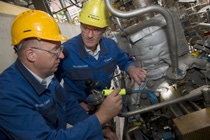Media
BASF to increase capacity for Alkylethanolamines in Ludwigshafen
- Capacity increase by 20 percent at Verbund site in Ludwigshafen
- Global capacity more than 110,000 metric tons per year
- Versatile intermediates with growing customer demand
BASF will increase the production capacity of Alkylethanolamines (AEOA) by 20 percent at the BASF Verbund site in Ludwigshafen, Germany. After the start-up in 2020, BASF’s global annual nameplate capacity of AEOA will be more than 110,000 metric tons per year at its production facilities in Ludwigshafen, Germany; Geismar, USA; and Nanjing, China.
“As one of the world’s leading suppliers of amines, we continue to support the fast-growing customer demand for products of our Alkylethanolamine portfolio by increasing our capacity. The demand is particularly high for high-performance products in the Water- and Gas Treatment industries”, said Dr. Andrea Frenzel, President, BASF Intermediates Division.
“The additional capacity in Ludwigshafen will primarily serve our strong European customer base”, adds Dr. Frank Stein, Senior Vice President, BASF Intermediates Amines Europe. “We have highly efficient manufacturing processes, and with this investment, we provide our customers greater flexibility and reliability of supply than before.”
The versatile Alkylethanolamines are mainly used as precursors for flocculants applied in water treatment and in the coatings industry where they act as binders between pigments and resins. Other applications include gas treatment, fabric softeners, in additives for metalworking fluids and polyurethanes.
With about 300 different amines, BASF has the world’s most diverse portfolio of this type of chemical intermediates. Along with alkyl-, alkanol- and alkoxyalkylamines, the company offers heterocyclic and aromatic as well as specialty amines. The range is completed by an expanding portfolio of chiral amines of high optical and chemical purity. The versatile products are used mainly to manufacture process chemicals, pharmaceuticals and crop protection products, as well as cosmetic products and detergents. They also serve to produce coatings, special plastics, composites and special fibers.
Receive the latest press releases from BASF via WhatsApp on your smartphone or tablet. Register for our news service at basf.com/whatsapp-news.
About BASF Intermediates
The BASF Group’s Intermediates division develops, produces and markets a comprehensive portfolio of about 700 intermediates around the world. Its most important product groups include amines, diols, polyalcohols, acids and specialties. Intermediates are for example used as precursors for coatings, plastics, pharmaceuticals, textiles, detergents and crop protectants. Innovative intermediates from BASF help to improve both the properties of final products and the efficiency of production processes. The ISO 9001 certified Intermediates division operates plants at production sites in Europe, Asia and North America. Around the globe the division generated sales to third parties of about €3,1 billion in 2018. For more information, go to www.intermediates.basf.com
About BASF
At BASF, we create chemistry for a sustainable future. We combine economic success with environmental protection and social responsibility. The approximately 122,000 employees in the BASF Group work on contributing to the success of our customers in nearly all sectors and almost every country in the world. Our portfolio is organized into six segments: Chemicals, Materials, Industrial Solutions, Surface Technologies, Nutrition & Care and Agricultural Solutions. BASF generated sales of around €63 billion in 2018. BASF shares are traded on the stock exchange in Frankfurt (BAS) and as American Depositary Receipts (BASFY) in the U.S. Further information at www.basf.com.
P-19-181


